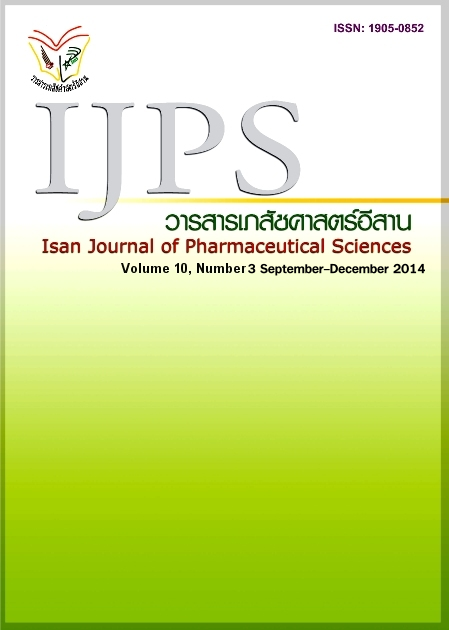Effects of Elderly Care with Chronic Diseases on Quality Use of Medicine at Home in Area of Sub-district Health Promoting Hospitals, Somdet District, Kalasin province
Main Article Content
Abstract
Introduction: This study aimed to determine the impact of home quality use of medicine in chronically ill elderly patients in the health promoting hospitals of Somdet District, Kalasin Province. Clinical outcomes were medication compliance, adverse drug reactions, rehospitalization/ER-visit, treatment cost, and quality of life. Methods: This quasi-experimental study was conducted between February and July 2013. One hundred elderly patients with diabetes mellitus (DM) type 2 and/or hypertension (HT) patients in two sub-districts (Mahachai and Mhoomon) were included. The experimental group (n = 50) was provided elderly care for quality use of medicine at home by health care teams for six visits (once per month). The control group (n=50) received usual care. Data was collected by Patient data recorder sheet, WHO’s algorithm and quality of life (QoL) was assessed by the SF-36. Baseline characteristics were analyzed by descriptive statistics. Comparison within group, paired t-test and McNemar test were used. Comparison between two groups, Chi-square, Fisher’s exact test and independent t-test were used. Results: At the end of six months follow-up, fasting blood sugar (FBS) in the experimental group was signifcantly lower than the control group (119.70±30.19, 147.08±52.72 mg/dl, p=0.002). Systolic blood pressure (SBP) in the experimental group was signifcantly lower than the control group (126.86±11.96, 134.40±16.09 mmHg, p=0.009). Medication compliance of the experimental group was signifcantly higher than the control group. Incidence of adverse drug reactions (ADRs) in the experimental group was also reduced. The incidence of re-hospitalizations or ER visits, for the experimental group was lower than the control group and amounted to a cost savings of 7,527 baht. Quality of life (QOL) score for the experimental group was signifcantly higher than the control group in fve out of eight domains. Conclusions: The six month elderly care for quality use of medicine at home by health care team can improve clinical outcomes and medication compliance, prevent adverse drug reactions, reduce re-hospitalizations or emergency room visits, decrease health care cost and improve quality of life.
Article Details
In the case that some parts are used by others The author must Confirm that obtaining permission to use some of the original authors. And must attach evidence That the permission has been included
References
Collins C, Limone BL, Scholle JM, Coleman CI. Effect of pharmacist intervention on glycemic control in diabetes. Diabetes Res Clin Pract 2011;92:145-52.
Debavalya U, Moolasarn S, Orossarum J, Samangsri K, Yenwijitsopa A, Jaipen P. The Impacts of Home Care Pharmacy Service in Diabetic Patients. Thai J. Hosp. Pharm 2008; 18(1):39-51.
Hepler CD, Strand LM. Opportunities and respon¬sibilities in pharmaceutical care. AJHP 1990; 47:533-43.
Human Resources Planning Division. Population Projections for Thailand 1990-2020. National Economic and Social Develop¬ment Board; 1995.
Jaisa-ard R, Kanjanarach T. Needs for compe¬tency improvement in pharmacy service at a primary care level. IJPS 2014; 10(1): 69-79.
Lee VW YP, Kong KW, Chan PK, Kwok FL. Impact of pharmacy outreach services on blood pressure management in the elderly community of Hong Kong. Geri¬atrGerontolInt 2012;13(1):175-181.
Lee JK, Grace KA, Taylor AJ. Effect of a phar¬macy care program on medication adher¬ence and persistence, blood pressure, and low-density lipoprotein cholesterol: a randomized controlled trial. JAMA 2006; 296(21): 2563-71.
Leumarnkun W, Meetam P. Development of a Quality of Life Questionnaire : SF-36 (Thai Version). TJPS 2000; 24(2): 92- 111.
Polkoat N. Effects of Discharge Counseling and Home-based Interventions Provided by Pharmacist Among Elderly Patients. Master of Pharmacy Thesis in Clinical Pharmacy, Graduate School, KhonKaen University 2007.
Phosena O, Sricharee S, Tembeab N, Dornchot K, Mhongput P. The Outcome of Phar¬maceutical Care in Patients with Diabe¬tes Mellitus and Hypertension by Phar¬macists at District Health Promotion Hospital. Thai J. Hosp. Pharm 2012; 22(2): 106-14.
Sirimai P. Evaluation of a Pharmaceutical Care Model on Hypertensive Management at PrachuapKhiri Khan Hospital. Master of Pharmacy Thesis in Clinical Pharmacy, Graduate School, KhonKaen University 2001.
Sriwarakorn S., Krittiyanunt S., Sakulbumrungsil R. Sensitivity and Specificity of Thai- Version Brief Medication Questionnaires. J Health Res 2010; 24(3): 129-134.
Sadakorn S., Saengcharoen W., Wongpoowarak P., Lerkiatbundit S. Clinical Impact of Pharmacist Counseling on Type 2 Dia¬betes Patients. IJPS 2014; 9Suppl1: 116-121.
Syarstad BL, Chewning BA, Sleath BL, Claesson C. The Brief Medication Questionnaires: A tool screening patient adherence and barriers to adherence. Patient Educ¬Couns 1999; 37:113-24.
Tanomkit P, Chummalee I, Maleewong U. Effec¬tiveness of Pharmaceutical Care in Type 2 Diabetes Mellitus Elderly at Kamrieng Primary Care Unit, Maha Sarakham. IJPS 2009;5(2): 167-173.
Wiboonsirikul K, Rattanamanee K. Outcome of Medication Therapy Management Serv¬ices In Health Promoting Hospital Tam¬bon Hansung, Bangpahan District, Phra Nakhon Si Ayutthaya Province. JPMAT 2011;1(1):25-36.
Woodward M, Katz B, Elliott R, Vernon G, Tanner F, Saunders R. Problems with Medication Use in the Elderly: An Australian Per¬spective. JPPR 2006;36(1):58-66.


